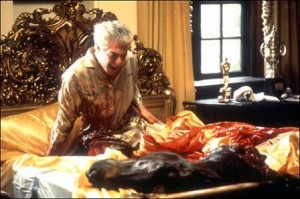Fictional movie director Jack Woltz, after refusing to cast a part to The Godfather’s godson, Johnny Fontane, woke up with a horse head in his bed.
Europeans are waking up to horsemeat in food – some with horror, some with  delight.
delight.
Food fraud and hucksterism is as old as human trade.
But given the depth, the cultural variations and the criminal element involved in substituting cow with horse, one wonders – what were all those food inspectors doing all along?
The New York Times reports that few things divide British eating habits from those of Continental Europe as clearly as a distaste for consuming horse meat, so news that many Britons have unknowingly done so has prompted alarm among shoppers and plunged the country’s food industry into crisis.
A trickle of discoveries of horse meat in hamburgers, starting in Ireland last month, has turned into a steady stream of revelations, including, on Friday, that lasagna labeled beef from one international distributor of frozen food, Findus, contained in some cases 100 percent horse meat.
The widening scandal has now touched producers and potentially millions of consumers in at least five countries — Ireland, Britain, Poland, France and Sweden — and raised questions of food safety and oversight, as well as the possibility of outright fraud in an industry with a history of grave, if episodic, lapses despite similarly episodic efforts at stricter regulation and reform. Already, tens of millions of hamburgers from several suppliers have been recalled.
Though public health is not at issue now, government oversight is, and the latest developments have echoes of earlier European food safety crises, including mad cow disease in Britain and dioxin in eggs and poultry in Belgium. Those tended to mushroom once investigators traced products through the Continent’s complex web of producers, food makers and suppliers.
The Guardian notes the eating of horses has a long history. Many prehistoric cultures both ate and sacrificed horses, and the ban on horse meat by Pope  Gregory III in 732 was in part an attempt to eradicate pagan rituals in the Germanic states.
Gregory III in 732 was in part an attempt to eradicate pagan rituals in the Germanic states.
Bowing to cultural concerns, the UK Food Standards Agency didn’t say horse meat was safe as long as it was piping hot, but rather issued interim advice to public institutions, such as schools and hospitals, caterers, and consumers purchasing from caterers, reminding public of their responsibility for their own food contracts. We expect them to have rigorous procurement procedures in place, with reputable suppliers.
Sweden’s National Food Agency (Livsmedelsverket) is considering reporting food giant Findus to the police over the horse meat lasagne scandal, and France is very, very angry, blaming Romanian butchers and Dutch and Cypriot traders as part of a supply chain that resulted in horsemeat disguised as beef being sold in frozen lasagna around the continent.
At some point, maybe a retailer will take responsibility for the food it sells.
The following animation is over the top, but indicative of what’s out there.
